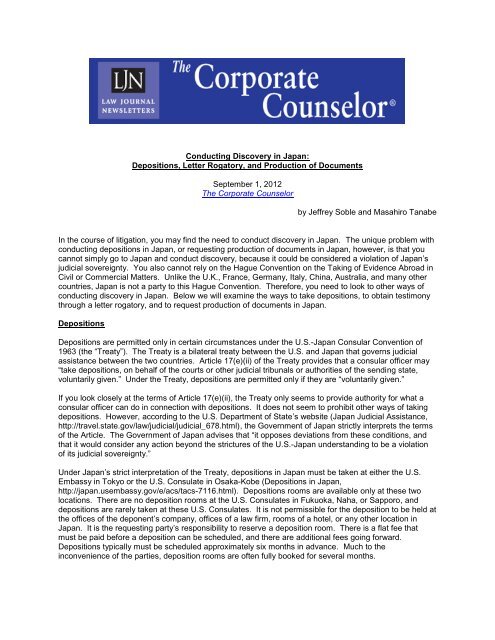Typical Difficulties Faced When Carrying Out Letters Rogatory Requests
Typical Difficulties Faced When Carrying Out Letters Rogatory Requests
Blog Article
Letters Rogatory Explained: Facilitating Legal Teamwork In Between Countries

Interpretation of Letters Rogatory
Letters rogatory are formal demands made by a court in one territory to a court in another territory, looking for support in getting evidence or statement for a legal action. This procedural device is necessary in the context of international law, where lawful systems might vary, and cross-border teamwork is required. Letters rogatory assist in the celebration of info that might be crucial for adjudicating instances, especially in instances including intricate transnational problems.
Normally, these requests develop in civil, criminal, or management matters where a celebration requires proof that is situated outside the territory of the requesting court. The letters act as a way to make sure that the concepts of due procedure are upheld, enabling courts to access evidence that might otherwise remain inaccessible because of geographic or legal barriers.
Making use of letters rogatory is governed by international treaties, bilateral agreements, or domestic laws, which delineate the procedures and commitments of the courts entailed. It is essential to keep in mind that the implementation of such demands is not ensured; they depend upon the legislations and techniques of the territory getting the letter. Thus, letters rogatory are an essential tool for fostering lawful cooperation and ensuring justice throughout boundaries.
The Process of Issuing Letters Rogatory
Issuing letters rogatory involves an organized procedure that makes sure compliance with both worldwide and domestic lawful requirements. The asking for party, typically a court or legal authority, prepares a formal demand outlining the nature of the assistance sought, the proof or info needed, and the lawful basis for the request. This file must be specific to assist in understanding by the foreign territory.

The following action entails sending the letters rogatory to the assigned foreign authority. This is typically done with diplomatic channels or global lawful help frameworks, guaranteeing that the request is obtained and recognized by the foreign court. The foreign court after that refines the request according to its own legal treatments, inevitably reacting to the requesting party with the sought-after details or proof, thus facilitating global lawful collaboration.
Importance in International Regulation
The relevance of letters rogatory in worldwide law can not be overemphasized, as they work as an essential mechanism for judicial participation throughout borders. These official ask for assistance in lawful matters permit courts in one territory to inquire, evidence, or the existence of witnesses from another territory, thus facilitating the management of justice in transnational situations.
Letters rogatory are particularly vital in the context of globalization, where legal disagreements typically extend several nations. They enable the my company collection of proof that might or else be inaccessible, making sure that lawful procedures are educated and fair. By cultivating partnership in between judicial systems, letters rogatory assistance maintain the rule of legislation and advertise mutual respect amongst countries.
Furthermore, the usage of letters rogatory demonstrates a commitment to worldwide standards and principles of teamwork, mirroring the interconnected nature of modern legal methods. It highlights the importance of adhering to well established treatments and treaties, such as the Hague Convention, which provides a framework for these requests - Letters rogatory. Eventually, letters rogatory boost the efficacy of straight from the source legal processes, making sure that justice is not prevented by geographical boundaries
Difficulties and Limitations
Regardless of their relevance, letters rogatory face several difficulties and constraints that can restrain their effectiveness. One primary issue is the varying legal structures and procedures throughout jurisdictions, which can result in misunderstandings and hold-ups in the implementation of demands. Various countries may have unique demands for the credibility of letters rogatory, making complex the procedure additionally.
In addition, the often protracted nature of international legal collaboration can impede timely access to evidence or witnesses. This delay might detrimentally influence lawful procedures or continuous investigations, particularly in cases requiring urgent action. Moreover, the absence of sources and training in some territories can cause inadequate handling of demands, bring about insufficient or insufficient responses.
Cultural distinctions and differing attitudes towards lawful procedures can likewise pose substantial obstacles. Countries with much less formal lawful systems might struggle to abide with the procedural roughness anticipated in letters rogatory. Finally, political tensions in between nations can affect the determination to execute demands, causing a lack of cooperation and reducing the energy of this system in international law. These challenges necessitate constant discussion and reform to improve the efficiency of letters rogatory in legal participation.
Case Research Studies and Instances

Conversely, difficulties can arise, as seen in a situation entailing a European country seeking proof in an ongoing criminal matter from a non-EU country - Letters rogatory. The process was delayed as a result of administrative difficulties and differing legal requirements, inevitably hindering the investigation
These examples highlight that while letters rogatory can facilitate international teamwork and quicken legal proceedings, they likewise highlight the need for clear interaction this article and understanding of lawful structures in between countries. Such study emphasize the importance of refining this tool to improve effectiveness and performance in international lawful issues.
Conclusion
In summary, letters rogatory work as an important system for assisting in lawful cooperation between nations, ensuring the collection of proof and testimony across jurisdictions. Their importance in worldwide legislation can not be overstated, as they promote due process and boost the efficiency of cross-border lawful process. Nevertheless, obstacles such as differing political tensions and legal structures might impede their efficiency. Continued efforts to streamline and boost the process are crucial for cultivating more powerful international judicial collaboration.
Letters rogatory are formal requests made by a court in one territory to a court in another territory, seeking aid in getting evidence or testament for a legal case. The requesting event, normally a court or legal authority, composes a formal demand outlining the nature of the assistance looked for, the evidence or details needed, and the lawful basis for the request. The international court then refines the request according to its very own lawful procedures, inevitably responding to the asking for event with the sought-after info or evidence, therefore facilitating international lawful teamwork.
Moreover, the use of letters rogatory shows a dedication to worldwide standards and concepts of cooperation, reflecting the interconnected nature of contemporary lawful practices.Worldwide lawful teamwork through letters rogatory is not without its real-world implications, as highlighted by numerous situation researches that highlight both obstacles and successes.
Report this page